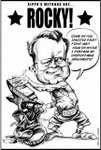"Anathema to those who spurn the teachings of the holy Fathers and the tradition of the holy Catholic Church, taking as a pretext and making their own the arguments of Arius, Nestorius, Eutyches, and Dioscorus, that unless we were evidently taught by the Old and New Testaments, we should not follow the teachings of the holy Fathers and of the holy Ecumenical Synods, and the tradition of the Catholic Church"
(The Council of Nicea 787, Acts of Session I)...[T]he [Eastern Orthodox] regard this council (Nicea 787) as infallible and inspired. Written over 700 years before the Reformation, this anathema could not have Protestantism in view. Yet, the Protestant position of sola Scriptura is roundly condemned and associated with some of the most notorious heretics in church history. The council correctly notes that Arius did appeal to Scripture in his denial of Christ's deity, just as the Jehovah's Witnesses do today. However, from our perspective, the problem with Arius was not that he held to sola Scriptura and thereby failed to give enough place to tradition, but that he twisted scripture's true meaning...
The names of Luther and Calvin could with equal propriety be placed alongside the notorious heretics listed. (Indeed, there were seventeenth-century EO confessions that did condemn the teachings of the Reformers by name. However, these are not mentioned here because these are local and not ecumenical councils.)
Sadly, the folks at Biola do not understand the distinction between "infallible" and "inspired" in Catholic and Orthodox theology. They have also confused the Acta of the Council for its output. And I find it highly amusing that the Biola folks think that Arius' main fault was "that he twisted scripture's true meaning" and not that "he held to sola Scriptura and thereby failed to give enough place to tradition". Anyone even remotely familiar with Arianism knows that its adherents appealed to Scripture against the traditions of the Church in an attempt to change the teaching about who Jesus was. There is an excelent explanation of this in a talk Begotten Not Made? Athanasius and the Creeds given by Protestant Scholar Hans Boersma:
http://www.regentaudio.com/product_details.php?item_id=148&category_id=85
According to the Edinburgh Edition of The Nicene and Post-Nicene Fathers,
Series II, Volume XIV, this was part of a confession of faith that was used to reconcile to Catholic unity some bishops who had fallen into the Iconclast heresy.
http://www.ccel.org/ccel/schaff/npnf214.xvi.v.html
Even though this was not part of the official teaching generated by the Seventh Ecumenical Council, it does represent the faith of the Catholic Church that met at the Council. As the Biola University paper states quite clearly, this statement could very easily have been directed against the scions of the Protestant Deformation. What is more important is that this quotation demonstrates clearly that the 16th Century Protestant principle of Sola Scriptura had been considered 750 years earlier as the very source of heresy and was therefore NOT compatible with the faith of the Patristic Church. In fact this very idea of a "neutral interpretation of Scripture" apart from the Church's Rule of faith had been condemned by St. Athanasius at the first Council of Nicea in 325 AD.
This is not an attempt to minimize the importance of Scripture which remains one of the three pillars on which the Catholic faith is established and is in the opinion of some Catholic scholars (e.g., Cardinal Ratzinger and Scott Hahn) the Primary source of our theology.
But Scripture cannot be understood properly unless it is in context within the bosom of the Catholic Church and the worldview established there by the superintendence of the Holy Spirit. Quite frankly, in the Arian case, the Protestant system would have been inadequate to deal with the challenge. A position based SOLELY on Scripture interpretation cannot be refuted by another mere human opinion. There must be an overarching authority that offers a definitive interpretation to which all the faithful must submit. We can see this problem within Protestantism with regard to the questions of the baptism of infants, paedocommunion, the necessity of baptism, church order, "eternal security," and the very meaning of salvation as in the Arminian vs. Calvinist controversy.
Had the Patristic Church practiced Sola Scriptura, she would never have been able to deals with the myriad of heresies that arose in that time about Christ, the Godhead, the use of images, and other issues. But in fact she adhered to the three fold triad of Scripture, Tradition, and Magisterium which still guides the Catholic Church today.
Art




No comments:
Post a Comment